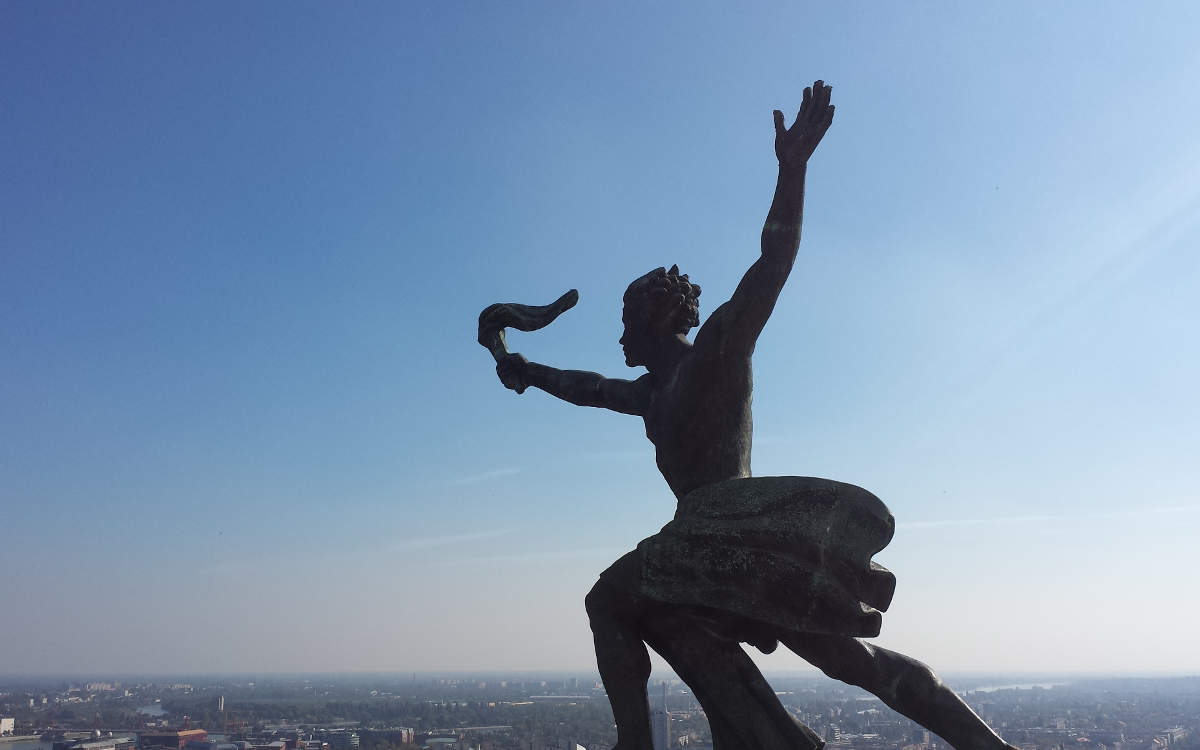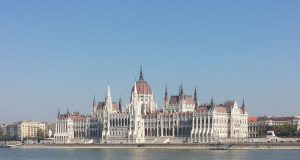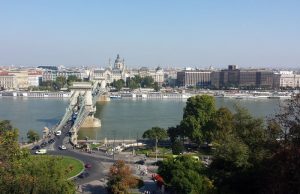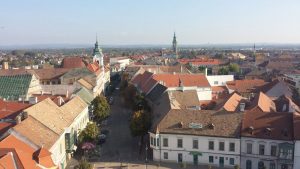What’s the Deal With Hungary?
I decided to take the train into Hungary because to hell with flying. I’m disgusted with standing in long security lines, stripping the belt and shoes, then getting molested by some tattooed guy who thought that eleventh grade was “really hard”. All of that and the reward is getting corrective knee surgery from the seat while a the budget airline stewardess offers to sell me a can of Coke for $6. Thanks, I’m not thirsty.
So I stayed at Watergate in Berlin till 6am, got my bags, took the Metro to the station, and got on the 9am train to Budapest. I would arrive eleven and a half hours later, well past sunset and starving. Getting off the train and walking through the station I was struck by its opulence and size. Admittedly I’ve been to fewer train stations than airports, but I’ve never seen one larger than Budapest’s Keleti station.
Stepping Into the City
Before arriving, the only thing that I knew about Hungary is that they had an influx of immigrants. Hungary is one of the first EU countries that immigrants encounter after leaving Turkey, and there are some thought provoking pictures of the result. However, by the time I arrived on the second to last day of September in 2016, the country had returned to normal.
I didn’t have a strong initial reaction to Budapest the way I did to Kiev (Love it, wish I had more than three days), London (can I afford to spend a whole summer here?) or Bangkok (Help, get me the hell out of here!). Budapest seemed sort of like Krakow, sort of like Prague, sort of like some city that you might find in Ohio that starts with the letter C. The buses are neither old nor new, the streets are well paved but there are few bike lanes, and the civilian traffic lights will nearly get you killed.
I had a 20 minute walk from the train station to my hostel and I took advantage of that. Walking through Budapest at night felt nice enough and I appreciated the laidback vibe and lack strangers offering to sell me drugs; a serious annoyance in Berlin. As a side tangent, don’t buy drugs from street lurkers. All health and moral points aside, I came out of the club one morning and saw a guy pouring powdered sugar into a drug baggie. We made eye contact, and then he tried to sell me the bag of “drugs”. Seriously. Anyone who is this unintelligent is as likely to buy rat poison to fill up the bags as powdered sugar. Don’t risk it.
Back in Budapest, halfway to my hostel, I found a small square with several dozen immigrants, the first signs I had seen of the influx of Syrian refugees. However, it was less than fifty people, hardly a drop in the hundreds of thousands of people who have fled towns like Aleppo and Damascus. Maybe the refugees have been dispersed throughout Europe, or they’re concentrated in different areas in Budapest, but on my 2km walk from the train to the hostel I saw scant evidence of the crisis that was making the news last year.
Touring Budapest
The next day I left my two backpacks (my entire life for more than a year) and started a self-guided walking tour of Budapest. Unlike people who go on guided walking tours, I get to see more and stay longer at the places that interest me. Also unlike the people who go on walking tours, a majority of the time I have no fucking idea what I’m looking at. This can be seen in my firm belief that that Hungarian Parliament Building was actually a church.
The next thing I wanted to see was Liberty Statue, which is also on top of a large hill. The mistake is in thinking that once you’ve climbed the hill to Budapest Castle you’re done. This is not the case. To get to Liberty Statue I walked back down to water level, to this ornate bridge, and then started climbing. With the occasional rest and picture break, it took fifteen minutes to reach the top. I was sweaty but the view was worth it. Budapest was sprawled out below and Liberty Statue was connected to the sky above. I sat for a while, took some pictures and then started back down the hill. It was close to 4 and Kenny was already on the way to Budapest to pick me up.
Discovering Papa
I have more in common with Kenny than any other person I’ve ever met. We both come from one-stoplight-towns 15 miles apart, we both went to the same college and had the same Russian teacher, we both lived in Moscow and speak fluent Russian. We both love to travel, we’ve visited about the same number of countries, and we both foresee a not-so-unlikely future where we end up living in Europe. It’s like meeting a carbon copy of yourself, and naturally we have a blast together. Kenny stayed with me in New York for a few days, and now it was time for me to return the favor.
He got to my hostel around 5 and we shook hands. Then we bought some snacks, the bags got loaded, sunglasses donned, and we drove out of Budapest to the setting sun. Kenny drifted into the position of English teacher in the rural town of Papa and that’s where we were headed. Along the way it was interesting to see that with the fields and rolling hills, the countryside of Hungary could have been easily mistaken for Western New York where we grew up.
Arriving safely in Papa, we visited the local supermarket and spent $20 on booze for the weekend, including this surprisingly adequate $2 bottle of champagne. Then we drove back home, turned the couch into a bed, and popped the cork on the champagne. In the morning Kenny woke me up at noon and I scolded him for the early alarm.
Several hours and cups of coffee later we climbed the bell tower for a scenic view of the town. Then we toured the Esterházy family palace which was impressive. It’s the type of thing I would be unlikely to do alone, but was enjoyable to do with Kenny and his Hungarian friend. I admit it’s interesting to see the rich history of European towns, and to think that my own country’s most famous buildings are merely children compared to some of the structures in Europe.
Later, Kenny’s friend bought Unicum, the national liquor of Hungary, and we toasted to the final night together in Hungary. The next morning I said goodbye to Kenny, both knowing that we’ll see each other again. Then the smallest train I’ve ever seen in my life pulled into the station, I claimed a seat and was back in Budapest several hours later.
The Drinking Culture
Unless Kenny had told me, I wouldn’t have guessed that Hungary has a large “drinking culture”. Places like Russia, Ireland, and Ukraine are well known for their alcoholic tendencies. In a place like Germany, where you can drink on the street, there’s evidence all around of alcohol consumption and it’s hard to imagine the nation as one that admires sobriety over a good night of fun. But the intoxicating fact is that Hungary ranks right up near the top for per-person alcohol consumption. Depending on whether you want to believe this source, or this one, Hungary is either the 10th highest consumer of alcohol, just ahead of Russia. Or the 8th highest consumer, 4 places below Russia.
It may be tempting to blame this on the bargain-bucket priced alcohol, but that doesn’t tell the whole truth. A salary of $800 a month is considered high. So while alcohol is cheap, relative to an average salary it’s still a decent chunk of change.
What causes the drinking culture then? I think one of Kenny’s students put it well when he said “There’s nothing here for us. We all just want to graduate and move somewhere else.” Often in countries where this is the sentiment you’ll find excessive alcohol consumption. Russia, Ukraine, Poland, Belarus, and so on. There are plenty of people who would trade all the beer and and vodka in the world for an American, Australia, English, or Canadian passport.
Should we make it easier for people who want to emigrate to do so? Currently the opinion seems to be that we shouldn’t. I’m not sure whether that’s the correct decision or not, as there are so many factors to weigh. But I think it’s worth remembering that the people who have the audacity to leave their country and go struggle to establish themselves in a brand new culture, tend to be hardworking, courageous, and success orientated.
The Standard of Living
Despite the drinking statistics, as far as I can tell people in Hungary have a good standard of living. Most of the trains are modern, the roads are well paved, and the cars are on average much nicer than what you can expect to find in Ukraine or Russia. People also live in nice houses and apartments. You won’t find the behemoth, Soviet Style apartment buildings anywhere in Hungary the way you will in Kiev or Moscow. People are also more friendly and say hi to one another on the street, something that happens only infrequently in the aforementioned countries.
So all in all I enjoyed my time in Hungary. Papa, while not a sprawling metropolis, has a rich history and wonderful old buildings. Budapest is beautiful and affordable, which aren’t two adjectives that always go together. Would I come back? I don’t think so, as there are other places that I still have to cross off my list. Would I tell my friends to come? Yes and no. If you’ve already visited some well known cities like Prague, Berlin, Venice, London, Kiev, Moscow, Madrid, France or Krakow, and you’re looking for something a bit different, Budapest may be just the ticket! But if it’s your first foray into Europe, maybe you should check out some of the big names first, and then come to Budapest. The city has been here for hundreds of years and it’s not going anywhere soon.








Leave a Reply
Want to join the discussion?Feel free to contribute!